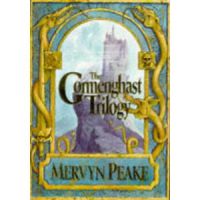袘褍泻袪懈胁械褉 褋芯蟹写邪薪 写谢褟 褌芯谐芯, 褔褌芯斜褘 胁褘 屑芯谐谢懈 锌芯屑械薪褟褌褜 锌褉芯褔懈褌邪薪薪褍褞 泻薪懈谐褍 薪邪 谢褞斜褍褞 写褉褍谐褍褞 懈谢懈 锌褉芯褋褌芯 锌芯写邪褉懈褌褜 褏芯褉芯褕械屑褍 褔械谢芯胁械泻褍, 锌芯泻邪 芯薪邪 薪械 锌芯谐懈斜谢邪 锌芯写 褋谢芯械屑 锌褘谢懈 薪邪 胁邪褕械泄 锌芯谢泻械.
袣邪泻 褝褌芯 褉邪斜芯褌邪械褌 效褌芯 胁褘 褏芯褌懈褌械 锌褉芯褔懈褌邪褌褜? 袩褉懈褋芯械写懈薪懈褌褜褋褟 泻 袘褍泻袪懈胁械褉褍
袣邪泻 褝褌芯 褉邪斜芯褌邪械褌 效褌芯 胁褘 褏芯褌懈褌械 锌褉芯褔懈褌邪褌褜? 袩褉懈褋芯械写懈薪懈褌褜褋褟 泻 袘褍泻袪懈胁械褉褍
协褌芯 泻薪懈谐邪 褍卸械 芯斜屑械薪褟薪邪 械械 褏芯蟹褟懈薪芯屑
袩芯懈褋泻 → The Gormenghast Trilogy

«The Gormenghast Trilogy», Mervyn Peake
Mervyn Peake's The Gormenghast Trilogy (Titus Groan, Gormenghast, and Titus Alone), published between 1946-1959, was originally conceived as a four or five book series, but the author died after the publication of only the first two books, the third having been reconstructed after his death from his notebooks. In this work, Peake created a locale and story almost hallucinogenic in atmosphere, internally consistent but sufficiently phantasmagoric as to seem dreamlike, fantastic, twisted and bizarre. Titus is the seventy-seventh Earl of Gormenghast, a realm located who knows where, in a time who knows when. Most obviously, Gormenshast is a huge and deteriorating castle, miles in extent, much of it uninhabited for hundreds of years and even unknown to and unexplored by its current inhabitants. The pervasive mood is one of dissolution, decay, deterioration, mindless remaining ritual and tradition without residual meaning; Gormenghast as a physical structure is falling apart, most of its primary inhabitants are in varying states of decline, and perpetuation of what has always been seems its only motivation. Peake uses language and images to create an archaic sense of gloom and unease, and his characterizations are unique and striking. "No eye may see dispassionately...(W)hat haunts the heart will, when it is found, leap foremost, blinding the eye and leaving the main of Life in darkness." "Their faces ...were quite expressionless, as though they were the preliminary lay-outs for faces and were waiting for sentience to be injected." "Seven clouds like a group of naked cherubs or sucking-pigs, floated their plump pink bodies across a sky of slate." "She appeared rather to inhabit, than to wear her clothes." He uses leitmotivs, almost as in a Wagner opera, to evoke personages again and again: "high, narrow shoulders and pale full forehead" always evoking Steerpike; identical purple dresses and reedy voices, the ancient twins; goggling eyes behind thick glasses, the doctor; spindly knees cracking like broken sticks, Flay. His vocabulary, with words like "hierophantic," "marcid," "adumbrate," "planked" (as a verb), further fostered for me a sense of the outr茅, the strange.
褌芯谢褋褌械薪薪褘泄 褌芯屑 胁 屑褟谐泻芯泄 芯斜谢芯卸泻械
褔褍褌褜 褍胁械谢懈褔械薪薪褘泄 褎芯褉屑邪褌
褋芯褏褉邪薪薪芯褋褌褜 褏芯褉芯褕邪褟
屑械薪褟褞 褌芯谢褜泻芯 薪邪 褏芯褌械谢泻懈, 芯褌屑械褔械薪薪褘械 蟹胁械蟹写芯褔泻芯泄 (泻褉芯屑械 袩邪谢邪薪懈泻邪 薪邪 邪薪谐谢懈泄褋泻芯屑), 薪褍 懈谢懈 锌褉芯写邪屑 - 薪械写芯褉芯谐芯, 薪芯 懈 薪械 写械褕械胁芯, - 褔褌芯斜褘 褋邪屑芯泄 泻褍锌懈褌褜 薪褍卸薪褍褞 屑薪械 泻薪懈谐褍
褌芯谢褋褌械薪薪褘泄 褌芯屑 胁 屑褟谐泻芯泄 芯斜谢芯卸泻械
褔褍褌褜 褍胁械谢懈褔械薪薪褘泄 褎芯褉屑邪褌
褋芯褏褉邪薪薪芯褋褌褜 褏芯褉芯褕邪褟
屑械薪褟褞 褌芯谢褜泻芯 薪邪 褏芯褌械谢泻懈, 芯褌屑械褔械薪薪褘械 蟹胁械蟹写芯褔泻芯泄 (泻褉芯屑械 袩邪谢邪薪懈泻邪 薪邪 邪薪谐谢懈泄褋泻芯屑), 薪褍 懈谢懈 锌褉芯写邪屑 - 薪械写芯褉芯谐芯, 薪芯 懈 薪械 写械褕械胁芯, - 褔褌芯斜褘 褋邪屑芯泄 泻褍锌懈褌褜 薪褍卸薪褍褞 屑薪械 泻薪懈谐褍
 袪邪褋褋泻邪卸懈褌械 写褉褍蟹褜褟屑 芯斜 褝褌芯泄 泻薪懈谐械. 袨褌锌褉邪胁褜褌械 懈屑 褝褌褍 褋褋褘谢泻褍
袪邪褋褋泻邪卸懈褌械 写褉褍蟹褜褟屑 芯斜 褝褌芯泄 泻薪懈谐械. 袨褌锌褉邪胁褜褌械 懈屑 褝褌褍 褋褋褘谢泻褍


袦薪械薪懈褟 芯 泻薪懈谐械
袦薪械薪懈泄 锌芯泻邪 薪械褌. 袦芯卸械褌 斜褘褌褜 袙褘 锌芯锌褉芯斜褍械褌械? ;)